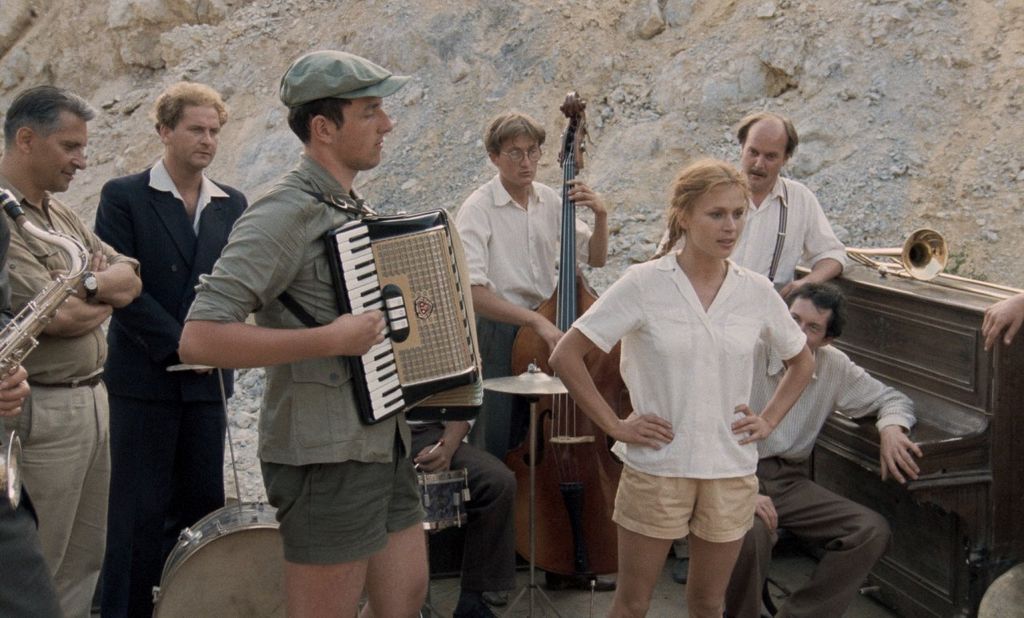Restored Copy of the Film Red Boogie by Director Karpo Godina

The third symposium, East/West: Borders Through Film and History, which explores life along the Slovenian-Italian border through moving images, delivered an exceptional film experience on May 7 at 8:30 p.m. in the House of Film in Gorica. A freshly restored copy of the film Red Boogie by director Karp Godina from 1982 was shown, with the director himself joining us for the occasion.
Set in the aftermath of the Second World War, during the implementation of the socialist five-year plan, the film follows a radio station's decision to dispatch a group of young musicians to various work brigades, agricultural cooperatives, and construction sites to boost morale. However, as they attempt to entertain the masses with their music, the young musicians find themselves in an unexpected predicament: they must undergo re-education to align with the ideals of conscious youth, as their jazz and boogie music is deemed imperialistic. Leading the group is Maks, a seasoned heartbreaker whose future hinges on the success of the tour.
The film takes viewers on a journey aboard a rickety bus, unraveling the tragicomic interplay between art, politics, and daily life in post-war society. The restoration of the film was coordinated by the Slovenian Cinematheque in collaboration with the Slovenian Film Archive at the Archives of the Republic of Slovenia and the Slovenian Film Center.
An outstanding aspect of this event is that the film's creator was awarded the Darko Bratina Award in 2012 at the cross-border film festival Tribute to a Vision. He was recognized for the integrity of his original work as a director and director of photography, as well as for his pedagogical contributions to training new generations of filmmakers. His body of work is characterized by stylistic subtlety and daring experimentation, consistently emphasizing the interconnectedness of poetic and political dimensions, while simultaneously expressing both ironic detachment and genuine compassion for individuals in a multicultural environment.
Both the film Red Boogie and Karpo Godina's entire oeuvre represent significant contributions to the cultivation of critical and philanthropic consciousness, advocating for the advancement of a free and pluralistic society within both the Yugoslav cinematic landscape and Slovenian film.
On May 23, 2024, the Slovenian Cinematheque will showcase an exhibition titled "Karpo Godina: The Film Imaginary," which will run until December 22. They remarked, "Karpo Godina is a surprisingly aesthetically perfect artist, always subversive but never cynical, witty and consistently curious as a humanist, a master craftsman, and a man dedicated to exploring and appreciating the world around him. The exhibition encapsulates all of these facets, meticulously framed through the lens of the camera within the confines of the static frame."
Announcements/
Filmska umetnost kot orodje preseganja meja
09. 04. 2025Nekatere meje so vidne, druge nevidne. Nekatere ločujejo, druge združujejo. Obmejna regija med Slovenijo in Italijo je bila stoletja prizorišče prepletanja kultur, zgodovinskih preobratov in človeških usod. Lahko zgodovino pogledamo skozi film in jo razumemo skozi umetnost? Retrospektiva Oriente Vzhod / Occidente Zahod – Meja skozi film in zgodovino, ki jo Kinoateje organizira v sodelovanju s številnimi partnerji in je del uradnega programa Evropske prestolnice kulture GO! 2025 ponuja prav to – potovanje skozi filmske podobe, ki raziskujejo življenje na robu in središču Evrope hkrati.
Popotnica retrospektivi: Stojan Pelko in Vlado Škafar
09. 04. 2025Zdaj, ko je prestolnično leto že v polnem teku, je mogoče nekoliko lažje primerjati posamezne discipline oziroma sklope programov. Upam si reči, da je Filmsko mesto, kakor smo poimenovali cel sklop filmsko-kinematografsko-avdio-vizualno-animiranih projektov eden tistih, ki dobesedno hkrati producira rezultate doma in na tujem – pri čemer doma pomeni ne le v goriškem somestju in po Sloveniji, ampak po celi Evropi.
Transcending Borders Through Film – Andrej Šprah
09. 04. 2025Film clubs play a crucial role in shaping film practices, cultures, and policies, as they serve as spaces for intense discussions where new ideas emerge. These clubs often evolve into institutions, although institutionalization is not always necessary.

